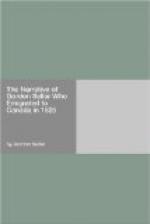With the coming of these new neighbors, a school became necessary and in it services were held on Sunday. The master sought the help of a Presbyterian minister in Toronto. He came once; on finding how rude everything was, he declined to return. A North of Ireland family was no more successful with an Anglican minister. He had newly come out from a cathedral city in the south of England and was shocked to find the log school had not a robing-room. The end was that a Methodist circuit-rider took in our settlement in his rounds, which resulted in a majority of those who attended his services uniting with the Methodist church. The ministers who came from the Old Country in those early days were singularly unfit for new settlements. The Anglican on landing assumed he was the only duly accredited clergyman, and was offended at his claim being slighted, while his feelings were jarred by the lack of conditions he considered essential to the proper conducting of worship. The Presbyterian ministers were more amenable to the changes, yet their ideals were of the parishes they had known in Scotland—a church, a manse, a glebe, tiends, and a titled patron. The effects of State established churches in the Old Land were thus felt in the backwoods, which was shown more markedly in the strife to reproduce State churches in Canada. I look back with distress to the bitter controversy which went on from year to year over the possession of the revenue from the clergy reserves. The cause of strife was not altogether the money, but the proof of superiority the possession of the fund would give. With many it was as much pride as covetousness. When we recall the energy that characterized the agitation over the clergy reserves, I think of what the same effort would have accomplished had it been directed to evangelize the province.




